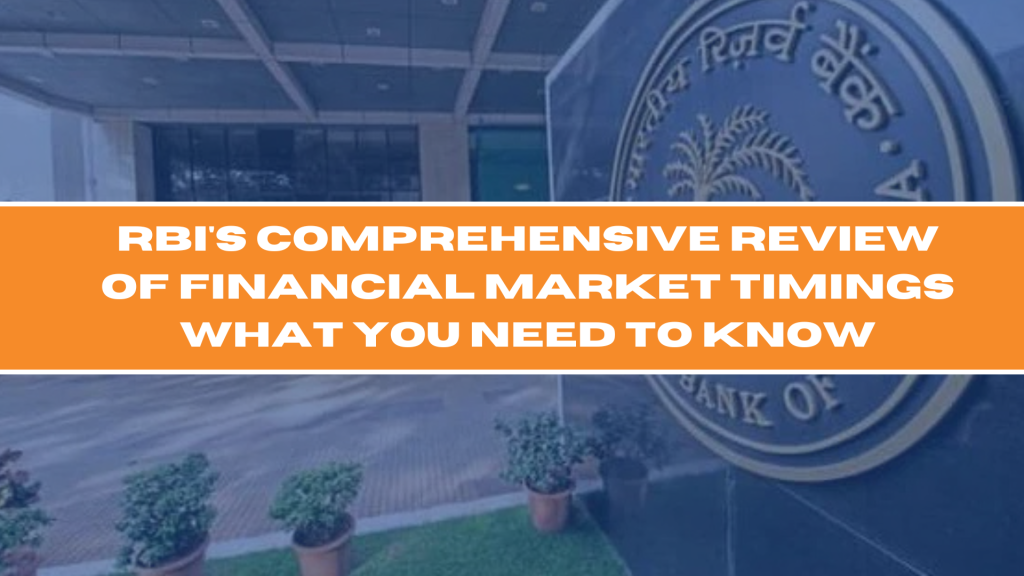The Reserve Bank of India (RBI) has created a buzz in the financial world with the news of RBI’s Comprehensive Reviewof financial market timings. Now before you bite your nails or give yourselves blood pressure thinking it’s another policy change, take a look at what it actually is! This move could affect financial professionals and the general investor who tracks their portfolio.
So firstly, let’s talk about why the change? Well, the Reserve Bank’s most primary goal is to bring more efficiency, transparency, and alignment with global markets. As you are aware, global markets tend to operate in other time zones. This implies that extending even a little bit to the market hours could result in more integration with global trade. The RBI’s Comprehensive Review implies that there might be a time when you will not have to wait until the next day to know how global cues affect your investments. You can read through our blog to learn more about this upcoming change .

What Markets Are We Talking About?
RBI’s review isn’t just for the stock market. It covers a wide array of financial markets including:
- Forex Market: This is where currencies are exchanged against one another. From rupees being exchanged with dollars or euros with yen, it all happens in the Forex market. It’s the world’s largest financial market and it works round the clock across all time zones operating 24 hours a day on worldwide time zones. For traders, it offers ways to make profits from currency fluctuations, and for businesses, it assists in facilitating the management of foreign transaction risks.
- Money Market: The money market deals with short-term borrowing and lending, usually for periods of less than a year. It’s where businesses, governments, and financial institutions manage their short-term funding needs. Think of it as a marketplace for safe and liquid investments like treasury bills and certificates of deposit. While it might not offer huge returns, it’s a critical part of maintaining cash flow and financial stability.
- Debt Market: This is the market where bonds and other debt instruments are bought and sold. When companies or governments need to raise money, they issue bonds, essentially borrowing from investors with a promise to pay back with interest. The debt market is crucial for funding large projects, stabilizing economies, and offering investors a relatively safer alternative to stocks.
- Derivatives Market: If you like to bet on future prices of assets, this market is for you. The derivatives market deals with contracts whose value is derived from underlying assets like stocks, commodities, or currencies. It’s popular with traders looking to hedge risks or speculate on market movements. While potentially lucrative, it also requires a deep understanding of market dynamics.
Possible Changes in Market Timings
While RBI hasn’t set anything in stone yet, there are whispers of extended trading hours, especially in the Forex and Money markets. The current market hours are generally from 9 AM to 5 PM, but aligning with global standards might mean earlier starts or later closes. Imagine checking the markets with your morning coffee at 7 AM or wrapping up trades post-dinner. For financial professionals, this could mean longer work hours, but it might also bring more opportunities for profit and hedging against risks.
The Pros and Cons
- Global Alignment: Indian markets syncing with global peers could reduce overnight risk exposure. By aligning market hours with international exchanges, traders can react promptly to global news and events.
- More Opportunities: Extended hours could lead to more trading opportunities, potentially boosting liquidity. With longer trading windows, both institutional and retail investors could participate more freely, leading to higher trading volumes.
- Reduced Volatility: With more time to react to global events, the sharp market swings could be smoother. Extended trading hours allow markets to absorb and respond to international news gradually, rather than all at once during opening hours.
- Longer Work Hours: Financial professionals might find their workdays stretched. With extended market hours, the typical 9-to-5 schedule could become a thing of the past. Traders, analysts, and support staff might have to adjust to early mornings or late evenings, impacting work-life balance.
- Operational Challenges: Financial institutions may need to adjust their systems and staffing. Changes in market timings could mean upgrading technology to handle extended hours, ensuring that trading platforms and back-end systems run smoothly without glitches.
- Impact on Retail Investors: Those with day jobs might find it challenging to keep up with extended trading hours. Many retail investors juggle investing with full-time jobs or other commitments. With extended market hours, it could become difficult to monitor market movements throughout the day.
How Will This Impact You?
If you’re an investor, particularly a retail investor, don’t panic! The changes might seem daunting, but they could also bring flexibility. Imagine being able to trade outside of your 9-to-5 job or managing your portfolio with real-time global updates. It could make investing more dynamic and engaging. For financial professionals, brace yourselves! The extended hours might need a lifestyle tweak. However, the potential for growth and learning with global market integration could be immense.
Summing Up
While the specifics of RBI’s review are still under wraps, it’s clear that the intent is to modernize India’s financial markets. Whether you’re an investor, trader, or just someone who likes to stay updated with financial news, keeping an eye on this development is crucial. Stay tuned, adapt, and as always—invest wisely!
ixamBee specializes in providing expert guidance and resources for banking exams 2025, ensuring that you are well-prepared for the Upcoming Bank Exams like RBI Grade B, NABARD Grade B, IBPS SO, and more. Our courses align with the bank exam calendar 2024, covering all the essential topics. With a focus on the upcoming bank jobs, our Previous Year Papers, BeePedia, SSC CGL, SSC CHSL, SSC MTS and other Mock Tests are designed to help you excel in upcoming banking exams.
Also Read:
Educational Qualifications of RBI Grade B Candidates
Economic Crises and Recovery Strategies of Leading Nations
Everything to know about RBI Grade B Previous Year Cutoffs














